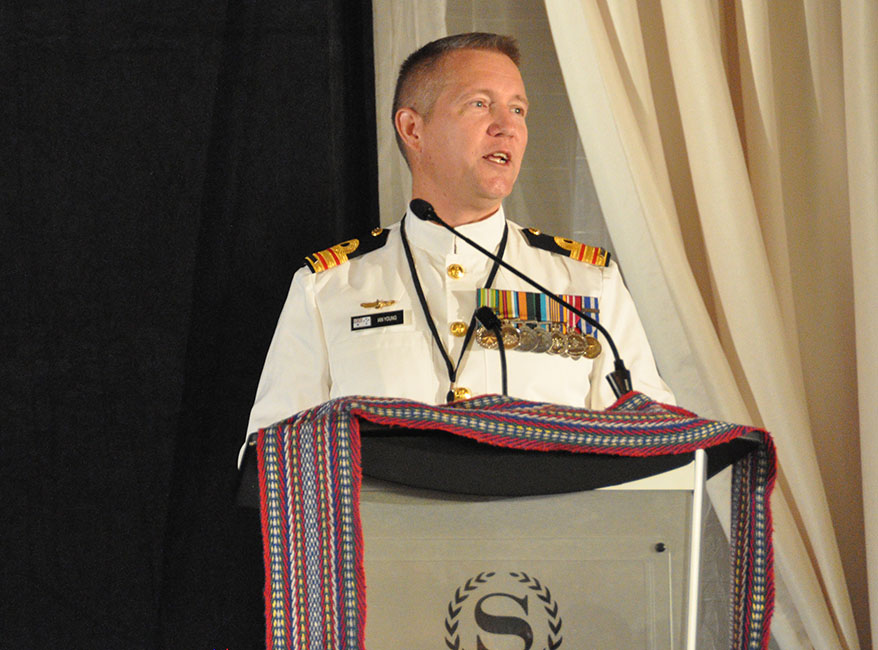
Honourary alumnus commander
Not many budding physicians envision themselves one day joining the military, moving halfway around the world and being deployed to Middle East war zones. But that’s exactly the path Commander Ian Young (MD’92) took.
By Amanda WoroniukTrained in family medicine and orthopedic surgery, Young’s career path has been anything but typical for a medical school graduate. Young serves as an orthopedic surgeon with the Maritime Operational Health Unit in the Australian Navy. He’s been deployed to Afghanistan and Iraq, and in non-combat roles to Southeast Asia and Australia. To maintain his surgical and clinical skills, Young is a full-time consultant orthopedic surgeon at Frankston Hospital in Melbourne and is the professional liaison officer for surgeons in the Navy. His civilian roles include the deputy director of surgery, adjunct senior lecturer for Monash University, supervisor of orthopedic training and member of the Victorian Trauma Committee.
Young gave the Honourary Alumni Lecture at this year’s Highlights in Medicine Alumni Conference. The event gave him time to reconnect with friends, and he reflects positively on his time in the college.
“The fondest memory really was the people,” said Young. “My classmates were all pretty awesome, we had a really good time. A very tight group. Knowing we were all working toward the same goal and at that point, although there might have been a bit of competition within the college, doing well on the exams, it really wasn’t like that. We had the competition to actually get into medical school and once we were in, everyone was really helpful and helped each other along.”
Becoming a physician fulfills a lifelong dream for Young—he recalled wanting to be a doctor when he was about 12 years old. Growing up in Regina, Young completed his anatomy degree prior to entering medical school at the University of Saskatchewan (U of S). He had an interest in sports medicine and orthopedics, and participated in a trauma orthopedic placement during his JURSI year at McMaster University. There, his surgical counterparts were surprised at his strong grasp of anatomy and medical knowledge, which he credits to a structured U of S learning model involving labs, exams and lectures; a contrast to McMaster’s program of independent, self-directed learning.
“What the U of S did was provide me with a good foundation in basic medicine,” continued Young. “Even though we weren’t a self-directed program we really had to put in (our) own effort and that set me up for success.”
Young completed his family medicine residency at Ottawa, followed by a surgical residency at the National Defense Medical Centre (NDMC), and stints at the National Defence Headquarters and the nautical vessel HMCS Provider.
“When I was doing family medicine training I did some orthopedic medical work just because I was interested in that aspect—injections, diagnoses, sports medicine. I became a member of the former Canadian Academy of Sports Medicine and that was a focus that I liked,” said Young. “Once I started working full-time in the military my first year was as a surgical resident at the NDMC, I think six months of my time was doing orthopedics, so that fostered my interest in orthopedics even further.
”By this time, he decided to transition to the Australian Navy to be closer to his wife’s family, and pursue his certification through the Royal Australia College of Surgeons. He recalled a visit from a recruiter during his first-year that sparked his interest in a military career. The officer talked about what the Canadian Armed Forces had to offer in terms of paid education and training.
For Young, the option to graduate without a huge financial debt was appealing. That, coupled with a trip to Europe after his first year, “gave him a taste of travelling life” and propelled Young to join Canada’s military program in his second year of medical school.
Young doesn’t mince words when talking about life in a war zone, but admitted at some point you learn to accept what’s beyond your control, even if there are some uncommon precautions you take.
“It’s scary (at) times when you know there are rocket attacks coming into your base or that there’s a high threat of a complex attack coming to your base,” said Young. “I can recall a few times even going to sleep with my body armour on because you’re just not sure what’s going to happen.”
Young indicated that his medical school training prepared him in some aspects for a military career. He admitted that while he wasn’t a frontline officer, doctors still deal with horrendous trauma. Young also cited the parallel between sleep deprivation as a physician and as an officer—you grab a nap when you get a chance.
Still, despite the challenge it can be to transition between military and civilian roles, Young said as a doctor, he really just likes to help people. Whether that’s the satisfaction of getting a good outcome in treating a patient, or training other health-care professionals, he likes to see others do well.
“I like to see other people achieve. I like to develop others. That gives me joy,” expressed Young. “When I see other people do well, that they’ve learned, that they’re enjoying their career, helping them along their journey, I get a lot of satisfaction out of that.”
What advice or words of wisdom would he pass on for current students attending the College of Medicine?
“Just that they are extremely fortunate to be in that college. Their degree opens doors to them and that really the sky’s the limit,” said Young. “If there is any aspect of medicine or even a different career outside of medicine, that they will get the skills at that university to achieve those goals. And have a rewarding career and rewarding life. Just grab the opportunities as they come.”
